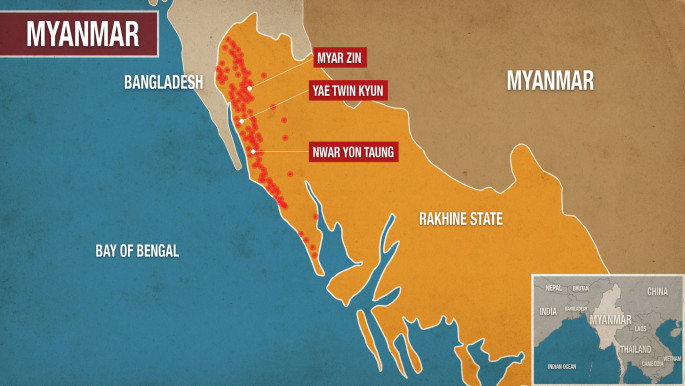Rohingya Muslims trapped in Myanmar's 'apartheid' regime for decades
Myanmar's draconian controls over its minority Rohingya Muslim population amount to "apartheid", Amnesty International said on Tuesday in a probe into the root causes of their mass exodus.
More than 600,000 Rohingya are languishing in Bangladeshi refugee camps after fleeing a brutal Myanmar army campaign launched in late August.
Scenes of dispossessed Rohingya fleeing en-masse as their villages in Rakhine State burn behind them have provoked outrage around the world.
There have given chilling and consistent accounts of widespread murder, rape and arson at the hands of Myanmar's security forces.
Amnesty's 100-page report, based on two years of research, details how years of persecution led to the current crisis, documenting a web of controls which meet the legal standard of the "crime against humanity of apartheid".
"Rakhine State is a crime scene. This was the case long before the vicious campaign of military violence of the last three months," said Anna Neistat, Amnesty's senior director for research.
 |
|
| Over 214 Rohingya villages have been destroyed by Myanmar's military in Rakhine State |
A years-long "state-sponsored" campaign has restricted virtually all aspects of Rohingyas' lives, the Amnesty study says, confining the Muslim minority to a "ghetto-like" existence in the mainly Buddhist country.
Myanmar's authorities "are keeping Rohingya women, men and children segregated and cowed in a dehumanising system of apartheid," she added.
The basis for the widespread hatred towards the Muslim group comes from a contentious 1982 Citizenship law.
Enacted by the then-junta, it effectively made hundreds of thousands of Rohingya stateless.
 |
Rakhine State is a crime scene. This was the case long before the vicious campaign of military violence of the last three months -Anna Neistat, Amnesty's senior director for research |
 |
Since then, Amnesty says, a "deliberate campaign" has been waged to deny the Rohingyas' right to live in Myanmar, where they are denigrated as "Bengalis" or illegal migrants from Bangladesh.
A system of identification cards is central to those bureaucratic controls, with Rohingya routinely issued one form of ID, only to see it later rendered meaningless.
"This is a system designed to make people hopeless," said Laura Haigh, Amnesty's Myanmar researcher.
She raised concerns that paperwork may be used to restrict the number of Rohingya returnees. Myanmar authorities have said they must be subject to a "verification" process.
"A lot of the burden of proof is going to be put on refugees, to prove that they are from Myanmar," said Haigh. "The government has records of these people, it's just choosing not to acknowledge them."
Prisons and ghost lands
Although the Rohingya have been victims of discrimination for decades, the report details how repression intensified after an outbreak of violence between Buddhist and Muslim communities in 2012.
Long before the recent exodus of Rohingya from northern Rakhine state - now a virtual ghost land of torched villages and unharvested paddy fields - they were unable to travel freely, requiring special permits and facing arrest, abuse and harassment at numerous checkpoints, Amnesty said.
In central Rakhine state, Rohingya Muslims were driven out of urban areas after the 2012 violence.
They remain completely segregated from the Buddhist community, confined by barbed wire and police checkpoints to camps which Amnesty likens to an "open-air prison".
The community has been widely denied access to medical care, their children cannot attend government schools and many mosques have been sealed off, the rights watchdog documented.
"Restoring the rights and legal status of Rohingya and amending the country's discriminatory citizenship laws is urgently needed," said Amnesty's Neistat.
"Rohingya who have fled persecution in Myanmar cannot be asked to return to a system of apartheid."



